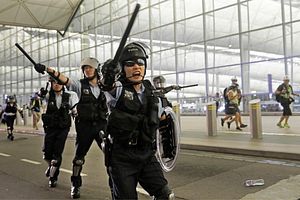Xi Jinping is a man beset, struggling on every front. The terror and lies of his ethnic cleansing of Turkic peoples in China’s west continue apace. Across the country, repression has reached levels unknown since the days of Mao Zedong’s disastrous campaigns. Abroad, Beijing’s threats and schemes are now being exposed with regularity, driving Taiwan away while presaging the treatment China’s neighbors might receive if the current regime grows unchecked. There seems to be no place in which the Chinese paramount leader may find refuge.
Enter the Hong Kong protesters. Incensed by a proposed extradition law, one more step in Beijing’s gradual erosion of Hong Kong’s special status, its citizens took to the streets to demonstrate. The Chinese authorities have allegedly been coordinating with Hong Kong’s Triads to suppress the protesters (working with organized criminal rackets seems to come easily to the Chinese Communist Party). Thus far, however, all the efforts of Hong Kong’s government, police, and others — including mainland police secretly brought in to quell protests — have been insufficient to suppress the people’s defense of their rights. Thus Hong Kong and the world wait to see if Xi will order in his powerful and numerous armed forces to crush the protesters.
Mao said that political power grows out of the barrel of a gun. But Confucius insisted that true rulership comes by right and virtue, echoing the admonition from Zechariah: “Not by might, nor by power.” There is no doubt that the might of Mao and Xi may subdue the masses for a time. But as long as people cherish freedom, Xi’s coercion and tyranny will fail in the end, just as Mao’s did.
Even if Xi’s strategy succeeds, it means the abject suppression of independent thought among the whole of China’s populace, hobbling China’s economy. Moreover, the world is beginning to crack down on an increasingly truculent China. Violently suppressing Hong Kong would put the lie to whatever remains of Beijing’s credibility and potentially turn China into a pariah state, a setback far greater than it experienced after the 1989 Tiananmen Massacre.
Hong Kongers are known for their business acumen, not their politics. If Beijing’s encroachments hadn’t begun to pinch them seriously, they would have left well enough alone. And as Hong Kong and Taiwan have shown, there is no contradiction between Chinese civilization and democratic governance. Thus Beijing’s attempted suppression of Hong Kong is Xi’s arbitrary decision, not a requirement of the situation.
Beijing equates the peaceful protests with “terrorism,” suggesting there is no lie so false they won’t tell it, and perhaps that there is no crime so vile they won’t commit it. Considering its prodigious capacity for violence, it may only be a fool’s hope that drives Hong Kongers to face down the government’s bullets with their own flesh.
Hong Kongers have made their point. Xi’s way out is to grant their requests and allow them to be patriotic citizens in their own way. One city, long independent, is no threat to China’s Communist Party. But a second Tiananmen Massacre might be.
The views expressed in this paper represent the personal views of the author and are not necessarily the views of the Department of Defense or of the Department of the Air Force.

































